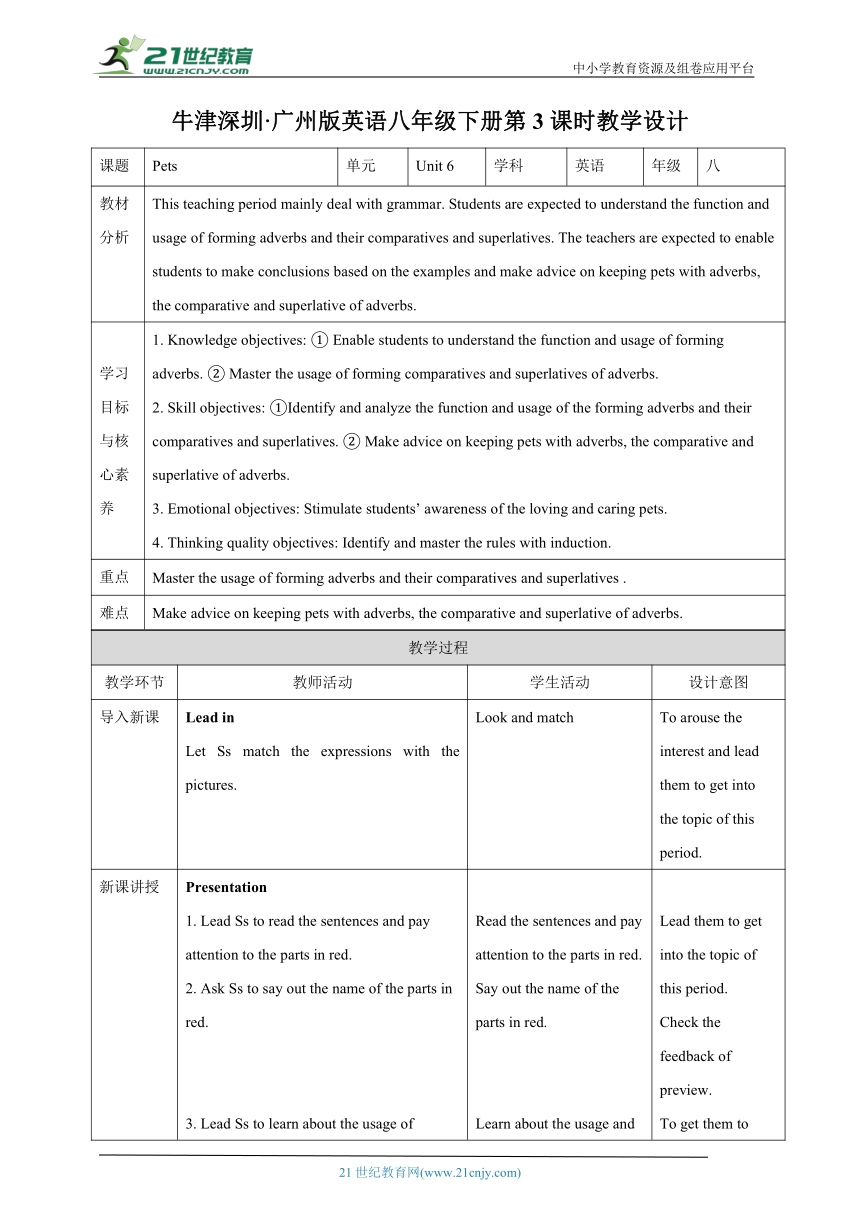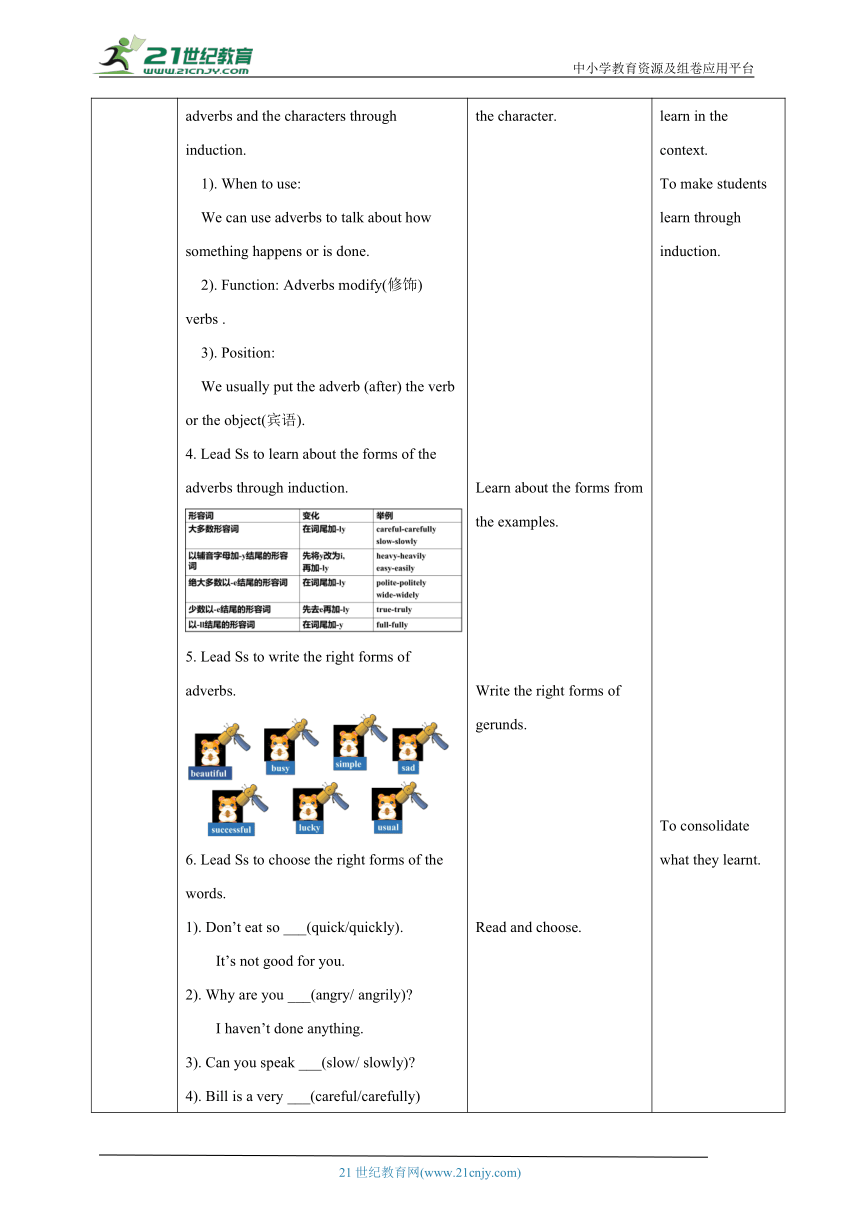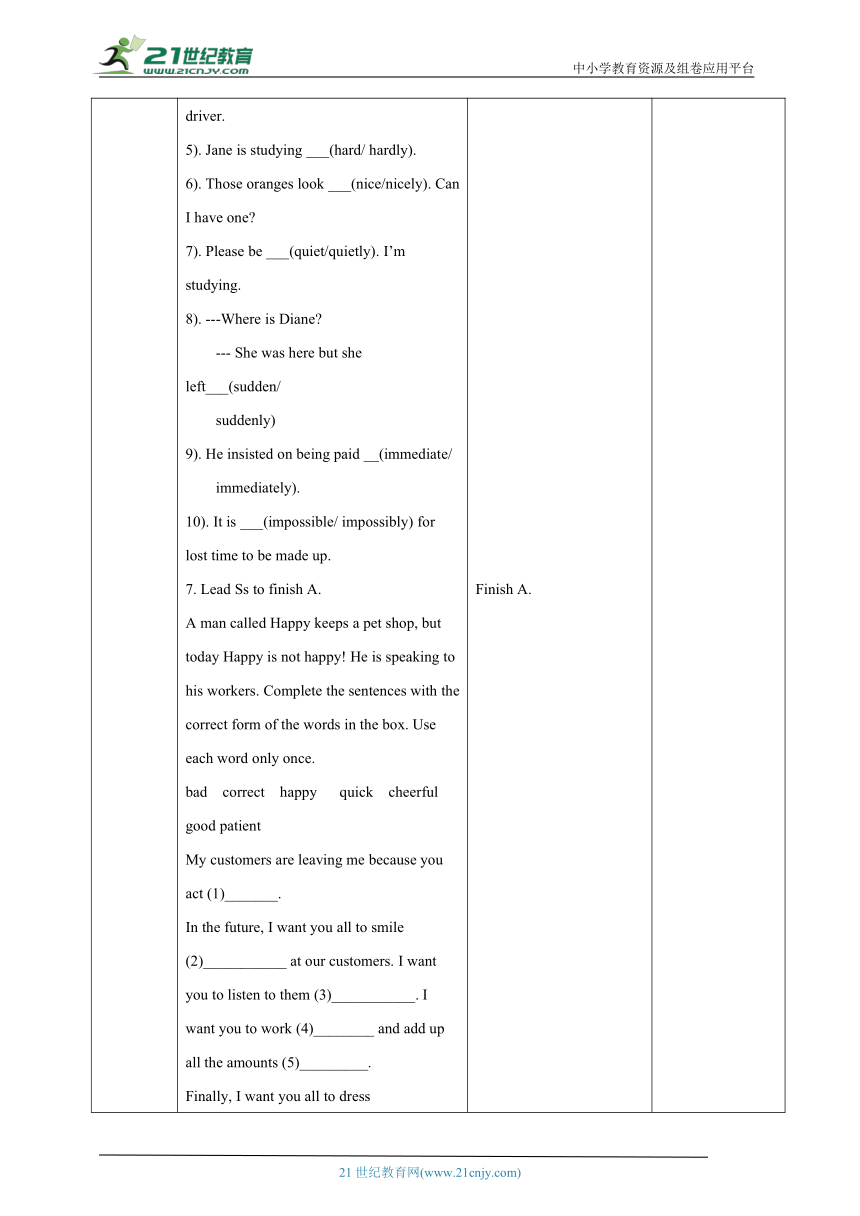【核心素养目标】Unit 6 Pets 第3课时Grammar 教案
文档属性
| 名称 | 【核心素养目标】Unit 6 Pets 第3课时Grammar 教案 |

|
|
| 格式 | doc | ||
| 文件大小 | 2.1MB | ||
| 资源类型 | 试卷 | ||
| 版本资源 | 牛津深圳版 | ||
| 科目 | 英语 | ||
| 更新时间 | 2023-04-11 16:21:55 | ||
图片预览



文档简介
中小学教育资源及组卷应用平台
课题 Pets 单元 Unit 6 学科 英语 年级 八
教材分析 This teaching period mainly deal with grammar. Students are expected to understand the function and usage of forming adverbs and their comparatives and superlatives. The teachers are expected to enable students to make conclusions based on the examples and make advice on keeping pets with adverbs, the comparative and superlative of adverbs.
学习目标与核心素养 1. Knowledge objectives: ① Enable students to understand the function and usage of forming adverbs. ② Master the usage of forming comparatives and superlatives of adverbs.2. Skill objectives: ①Identify and analyze the function and usage of the forming adverbs and their comparatives and superlatives. ② Make advice on keeping pets with adverbs, the comparative and superlative of adverbs.3. Emotional objectives: Stimulate students’ awareness of the loving and caring pets.4. Thinking quality objectives: Identify and master the rules with induction.
重点 Master the usage of forming adverbs and their comparatives and superlatives .
难点 Make advice on keeping pets with adverbs, the comparative and superlative of adverbs.
牛津深圳·广州版英语八年级下册第3课时教学设计
教学过程
教学环节 教师活动 学生活动 设计意图
导入新课 Lead inLet Ss match the expressions with the pictures. Look and match To arouse the interest and lead them to get into the topic of this period.
新课讲授 Presentation1. Lead Ss to read the sentences and pay attention to the parts in red.2. Ask Ss to say out the name of the parts in red.3. Lead Ss to learn about the usage of adverbs and the characters through induction.1). When to use: We can use adverbs to talk about how something happens or is done.2). Function: Adverbs modify(修饰) verbs .3). Position: We usually put the adverb (after) the verb or the object(宾语).4. Lead Ss to learn about the forms of the adverbs through induction.5. Lead Ss to write the right forms of adverbs. 6. Lead Ss to choose the right forms of the words.1). Don’t eat so ___(quick/quickly). It’s not good for you.2). Why are you ___(angry/ angrily) I haven’t done anything.3). Can you speak ___(slow/ slowly) 4). Bill is a very ___(careful/carefully) driver.5). Jane is studying ___(hard/ hardly).6). Those oranges look ___(nice/nicely). Can I have one 7). Please be ___(quiet/quietly). I’m studying.8). ---Where is Diane --- She was here but she left___(sudden/ suddenly)9). He insisted on being paid __(immediate/ immediately).10). It is ___(impossible/ impossibly) for lost time to be made up.7. Lead Ss to finish A.A man called Happy keeps a pet shop, but today Happy is not happy! He is speaking to his plete the sentences with the correct form of the words in the box. Use each word only once.bad correct happy quick cheerful good patient My customers are leaving me because you act (1)_______.In the future, I want you all to smile (2)___________ at our customers. I want you to listen to them (3)___________. I want you to work (4)________ and add up all the amounts (5)_________. Finally, I want you all to dress (6)________ . Do all these things, and I’m sure we’ll work (7)_________ together.8. Lead Ss to learn about the character of comparative and superlative of adverbs through induction and work out the rule.When we compare how something happens or is done, we use (adverbs).9. Lead Ss to learn about the usage of comparative and superlative of adverbs with the examples.10. Lead Ss to learn the rules and forms of the comparative and superlative of adverbs by induction.11. Lead Ss to complete the sentences.1). Walking is ________ (slow)than jogging.2).Of all the students, Lily does her homework .(careful)3).The team played _______ (well) on Saturday than on Tuesday.4).The first snow came a month_______ (early) than before. 5).Playing football is _____________(exciting) than watching it.12. Lead Ss to work out the rules and pay attention to the key points. To form the comparative and superlative of adverbs ending in -ly, we add _____ and _____ before them.· For adverbs that do not end in -ly and have the same form as the adjectives, we often add _____ and _____ to them.The comparative and superlative forms of badly, far, little, much and well are irregular:badly— worse— worst far— farther/ further— farthest/ furthestlittle— less— leastmuch— more—mostwell— better—best13. Lead Ss to choose the right words about Happy’s shop.Reporter: Hi, Happy. You seem to be really worried. What's the matter Happy: The income(收入) of my shop dropped even ______ (fast/ faster /more fastly) than last summer. Reporter: I think the doctors in your shop check the animals _______________ (skillfully/more skillfully/ less skillfully) than before.Happy: Yes, they do. They also treat the customers _______________ (friendly/ more friendly) than before. But customers came to my shop ____________ (regularly/more regularly/less regularly) than half a year ago.Reporter: That's strange!Happy: Probably because some new shops opened nearby. Reporter: Do you mean that customers like other shops ________ (well/ better/ the best) Happy: Yes. I think, of all the shops, LOVE is visited ___________ (much/ more/ the most) by customers. Read the sentences and pay attention to the parts in red.Say out the name of the parts in red.Learn about the usage and the character.Learn about the forms from the examples.Write the right forms of gerunds.Read and choose.Finish A.Learn about the character.Learn about the rules from the examples.Learn about the rules from the examples.Learn about the rules from the examples.Choose the right words. Lead them to get into the topic of this period.Check the feedback of preview.To get them to learn in the context.To make students learn through induction.To consolidate what they learnt.To make students learn through induction.To consolidate what they learnt. To make students learn through induction.To consolidate what they learnt. Get the students to be aware of what they have learnt.
课堂练习 1. Lead Ss to finish Practice2. Lead Ss to finish ProductionWork in groups Do the tasks. To make students use what they learnt and imagination to express themselves.
课堂小结 本课是语法课,学生通过观察例句、归纳和回顾等方法感知副词的功能、构成以及副词的比较级和最高级的用法并运用副词的比较级和最高级谈论饲养宠物等话题。
板书 The comparative and superlative of adverbsAdverbsComparativesSuperlativesNo.2at least 3Key wordsthan, A or B, much, a little, evenof/among/inForms-er/more/y→i+er-est/most/y→i+est
21世纪教育网 www.21cnjy.com 精品试卷·第 2 页 (共 2 页)
HYPERLINK "http://www.21cnjy.com/" 21世纪教育网(www.21cnjy.com)
课题 Pets 单元 Unit 6 学科 英语 年级 八
教材分析 This teaching period mainly deal with grammar. Students are expected to understand the function and usage of forming adverbs and their comparatives and superlatives. The teachers are expected to enable students to make conclusions based on the examples and make advice on keeping pets with adverbs, the comparative and superlative of adverbs.
学习目标与核心素养 1. Knowledge objectives: ① Enable students to understand the function and usage of forming adverbs. ② Master the usage of forming comparatives and superlatives of adverbs.2. Skill objectives: ①Identify and analyze the function and usage of the forming adverbs and their comparatives and superlatives. ② Make advice on keeping pets with adverbs, the comparative and superlative of adverbs.3. Emotional objectives: Stimulate students’ awareness of the loving and caring pets.4. Thinking quality objectives: Identify and master the rules with induction.
重点 Master the usage of forming adverbs and their comparatives and superlatives .
难点 Make advice on keeping pets with adverbs, the comparative and superlative of adverbs.
牛津深圳·广州版英语八年级下册第3课时教学设计
教学过程
教学环节 教师活动 学生活动 设计意图
导入新课 Lead inLet Ss match the expressions with the pictures. Look and match To arouse the interest and lead them to get into the topic of this period.
新课讲授 Presentation1. Lead Ss to read the sentences and pay attention to the parts in red.2. Ask Ss to say out the name of the parts in red.3. Lead Ss to learn about the usage of adverbs and the characters through induction.1). When to use: We can use adverbs to talk about how something happens or is done.2). Function: Adverbs modify(修饰) verbs .3). Position: We usually put the adverb (after) the verb or the object(宾语).4. Lead Ss to learn about the forms of the adverbs through induction.5. Lead Ss to write the right forms of adverbs. 6. Lead Ss to choose the right forms of the words.1). Don’t eat so ___(quick/quickly). It’s not good for you.2). Why are you ___(angry/ angrily) I haven’t done anything.3). Can you speak ___(slow/ slowly) 4). Bill is a very ___(careful/carefully) driver.5). Jane is studying ___(hard/ hardly).6). Those oranges look ___(nice/nicely). Can I have one 7). Please be ___(quiet/quietly). I’m studying.8). ---Where is Diane --- She was here but she left___(sudden/ suddenly)9). He insisted on being paid __(immediate/ immediately).10). It is ___(impossible/ impossibly) for lost time to be made up.7. Lead Ss to finish A.A man called Happy keeps a pet shop, but today Happy is not happy! He is speaking to his plete the sentences with the correct form of the words in the box. Use each word only once.bad correct happy quick cheerful good patient My customers are leaving me because you act (1)_______.In the future, I want you all to smile (2)___________ at our customers. I want you to listen to them (3)___________. I want you to work (4)________ and add up all the amounts (5)_________. Finally, I want you all to dress (6)________ . Do all these things, and I’m sure we’ll work (7)_________ together.8. Lead Ss to learn about the character of comparative and superlative of adverbs through induction and work out the rule.When we compare how something happens or is done, we use (adverbs).9. Lead Ss to learn about the usage of comparative and superlative of adverbs with the examples.10. Lead Ss to learn the rules and forms of the comparative and superlative of adverbs by induction.11. Lead Ss to complete the sentences.1). Walking is ________ (slow)than jogging.2).Of all the students, Lily does her homework .(careful)3).The team played _______ (well) on Saturday than on Tuesday.4).The first snow came a month_______ (early) than before. 5).Playing football is _____________(exciting) than watching it.12. Lead Ss to work out the rules and pay attention to the key points. To form the comparative and superlative of adverbs ending in -ly, we add _____ and _____ before them.· For adverbs that do not end in -ly and have the same form as the adjectives, we often add _____ and _____ to them.The comparative and superlative forms of badly, far, little, much and well are irregular:badly— worse— worst far— farther/ further— farthest/ furthestlittle— less— leastmuch— more—mostwell— better—best13. Lead Ss to choose the right words about Happy’s shop.Reporter: Hi, Happy. You seem to be really worried. What's the matter Happy: The income(收入) of my shop dropped even ______ (fast/ faster /more fastly) than last summer. Reporter: I think the doctors in your shop check the animals _______________ (skillfully/more skillfully/ less skillfully) than before.Happy: Yes, they do. They also treat the customers _______________ (friendly/ more friendly) than before. But customers came to my shop ____________ (regularly/more regularly/less regularly) than half a year ago.Reporter: That's strange!Happy: Probably because some new shops opened nearby. Reporter: Do you mean that customers like other shops ________ (well/ better/ the best) Happy: Yes. I think, of all the shops, LOVE is visited ___________ (much/ more/ the most) by customers. Read the sentences and pay attention to the parts in red.Say out the name of the parts in red.Learn about the usage and the character.Learn about the forms from the examples.Write the right forms of gerunds.Read and choose.Finish A.Learn about the character.Learn about the rules from the examples.Learn about the rules from the examples.Learn about the rules from the examples.Choose the right words. Lead them to get into the topic of this period.Check the feedback of preview.To get them to learn in the context.To make students learn through induction.To consolidate what they learnt.To make students learn through induction.To consolidate what they learnt. To make students learn through induction.To consolidate what they learnt. Get the students to be aware of what they have learnt.
课堂练习 1. Lead Ss to finish Practice2. Lead Ss to finish ProductionWork in groups Do the tasks. To make students use what they learnt and imagination to express themselves.
课堂小结 本课是语法课,学生通过观察例句、归纳和回顾等方法感知副词的功能、构成以及副词的比较级和最高级的用法并运用副词的比较级和最高级谈论饲养宠物等话题。
板书 The comparative and superlative of adverbsAdverbsComparativesSuperlativesNo.2at least 3Key wordsthan, A or B, much, a little, evenof/among/inForms-er/more/y→i+er-est/most/y→i+est
21世纪教育网 www.21cnjy.com 精品试卷·第 2 页 (共 2 页)
HYPERLINK "http://www.21cnjy.com/" 21世纪教育网(www.21cnjy.com)
同课章节目录
